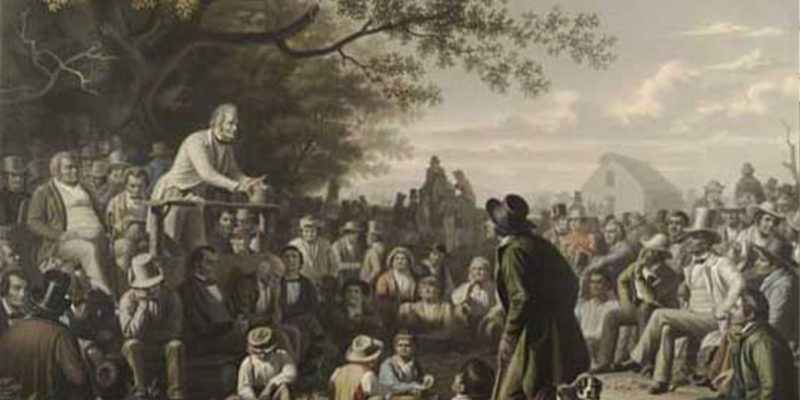Patrick Deneen has argued that both the philosophy of liberalism and the principle of academic freedom are fundamentally flawed. In this piece I argue that the liberal philosopher John Stuart Mill provides a convincing counterargument to Deneen’s criticisms.
In 2013, coastal geologist and hurricane researcher Ivor van Heerden settled for nearly $500,000 to conclude a roughly three-year legal battle with Louisiana State University (LSU). The former associate professor of research began working for the university in 1992. However, in 2005, his public blaming of the Army Corps of Engineers for the severe flooding in New Orleans during Hurricane Katrina caused controversy. LSU ordered van Heerden not to comment on the subject further. He was fired from his post as both a researcher and a teacher after he refused. In phone interviews after the settlement, van Heerden emphasized the relevance his win had for the defense of academic freedom. The former professor stated that money was never his primary goal; it was all about academic freedom (Lodge 2013). But what is it about academic freedom, such that it was worth losing a position he had held for over a decade, and that half a million dollars was secondary to its defense?
Academic freedom has been a foundational value of American higher education for just over a century. In 1915, when the American Association of University Professors (AAUP) was established, the 1915 “Declaration of Principles” was published. This piece explained and justified academic freedom. The ideas of the Declaration were further elaborated upon 25 years later in the 1940 “Statement of Principles on Academic Freedom and Tenure.” It was designed to protect professors from interference from public opinion, the government, or even their institutions. Academic freedom was supposed to promote the university’s mission of the increasing the sum of knowledge, providing instruction to students, and developing experts in various fields. Academic freedom is still a heavily debated topic. While court cases, such as Van Heerden v. Board of Supervisors, argue over the limits of academic freedom, some people think the principle itself is flawed.
In 2014, Harvard student Sandra Korn wrote “The Doctrine of Academic Freedom.” In the piece she argued that the very concept of academic freedom was troublesome. Statements like, “the liberal obsession with ‘academic freedom’ seems a bit misplaced to me,” and, “If our university community opposes racism, sexism, and heterosexism, why should we put up with research that counters our goals simply in the name of ‘academic freedom’?” She argued for “a more rigorous standard: one of ‘academic justice’.” Academic justice would ensure that “When an academic community observes research promoting or justifying oppression,” it would “ensure that this research does not continue.”
This article sparked significant controversy for an undergraduate work. It faced criticisms from publications such as Campus Reform, The American Conservative, and even the New York Times. Several pieces reacting to Korn’s position argued she was advocating for a form of academic “totalitarianism.” Tucker Carlson, a host on Fox News, went as far as to say “She’s basically not just attacking things she doesn’t like politically, she’s attacking the very notion of a liberal education.”
While some readers may find it undesirable to agree with the position of Fox News, it is indisputable that academic freedom is often defended on the premise that it is crucial to maintaining a liberal society. In the Supreme Court case, Healy v James, the majority opinion argued that “the vigilant protection of constitutional freedoms is nowhere more vital than in the community of American schools. The college classroom with its surrounding environs is peculiarly the ‘marketplace of ideas,’ and we break no new constitutional ground in reaffirming this Nation’s dedication to safeguarding academic freedom” (Healy v James 408).
In discussions concerning liberalism and academic freedom, the name John Stuart Mill, and his work On Liberty are unavoidable. It is more likely that two people arguing on the internet won’t eventually call each other “Hitler” than it is for book two of On Liberty not to be mentioned in discussions regarding the relationship between academic freedom and liberalism. How often have we been reminded that “the beliefs which we have most warrant for, have no safeguard to rest on, but a standing invitation to the whole world to prove them unfounded” (Mill 1989b, 24)? Or, that even “if all mankind minus one, were of one opinion, and only one person were of the contrary opinion, mankind would be no more justified in silencing that one person” (Mill 1989b, 20)? Mill is often regarded as a powerful defender of academic freedom.
In his 2017 book Why Liberalism Failed, Patrick Deneen argues – seemingly against Mill – that liberalism is fatally flawed. He argues that liberalism is a failed ideology that exchanged the classical notion of liberty as a principle of self-elevation and self-governance, for the modern idea of liberty as freedom from restraint. In doing so, liberalism undermined local customs and cultures, the liberal arts, and civic engagement. This new form of liberty destroyed the foundations for human flourishing. Further, academic freedom’s goals and roots are deeply liberal, and thus are problematic. As academic freedom only promotes research that will further the liberal creed, and silences voices and opinions deemed “illiberal,” it is a source of great academic injustice. Like Korn, Deneen advocates for the principle of academic justice, but argues that she has defined it improperly. Here, I argue that Mill (and perhaps liberalism more broadly) has an adequate defense against Deneen’s powerful critique.
For Deneen, academic freedom is a natural outgrowth of liberalism. It was, by design, meant to pursue liberal ends. While “‘Academic freedom’ purports to be an openness to all views and opinions,” it “contains an implicit philosophy” (Deneen 2014). It is not a neutral principle. In preliberal society, education was designed to teach students how to “use their liberty well” (Deneen 2018, 115). Education taught the community’s youth how to live according to the transcendent common good. Liberalism has no highest good. It is dedicated to emancipating individuals from the confines of nature and culture, and academic freedom was designed help realize this liberal goal in education.
Deneen argues John Stuart Mill’s writing provides insight into the liberal mission for education. In On Liberty, Mill argued that “freedom of inquiry (including academic freedom) was justified… in order to liberate humans from the dead hand of the past” (Deneen 2014). Modern education liberated individuals from the restraints of custom, allowing them to engage in what Mill called “experiments in living.” These “experiments” allowed individuals to find ways of maximizing their flourishing. They were not meant to help individuals commune with a higher good. Deneen might argue this is what Mill meant when he said humans were like trees. In On Liberty, Mill says human nature wasn’t like a machine, “built after a model,” but was “a tree” which needed to grow “according to the tendency of the inward forces that make it a living thing” (Mill 1989b, 60). Human beings didn’t share a grand purpose; each individual had to live in terms of a unique nature. To maximize the flourishing of individuals, the “liberation… from societal norms in favor of ‘individuality’” was required (Deneen 2014).
Deneen’s charges are not insignificant. But John Stuart Mill is up to the challenge. While many view Mill as defending liberty as freedom from restraint, Mill actually proposed a more positive form of liberty, making him ideal for opposing Deneen. Mill desired “to be a reformer of the world.” He aimed to improve the way individuals related to one another. His goal was to align society with the “superior excellence of unselfish benevolence and love of justice” (Mill 1989a, 98). Mill’s reform is based on the idea that society moves between two periods. The first is the “critical” period, and was a time of “criticism and negation.” Individuals “lose their old convictions without acquiring any new ones, of a general or authoritative character, except the convictions that the old ones are false” (Mill 1989a, 131). Eventually, mankind enters an “organic” period. In these periods, mankind would “accept with firm conviction some positive creed.” And, they would continue to use this creed for guidance, until they finally outgrew it (Mill 1989a, 131). The first period would destroy the old, while the latter would build the new. This continuous cycle would steer mankind towards truths, based not on faith and intuition, but on evidence and rationality. It would further the “interests of man as a progressive being” (Mill 1989b, 14).
Mill knew “mankind would be in a deplorable state if no principles or precepts of justice, veracity, beneficence” were practiced (Mill 1985, 27). Mill thought that as society continued to progress, a new religion would form. It was the “religion of humanity.” This new religion would help to guide individuals to better maximize the conditions for human flourishing (Mill 1985, 37). It would make individuals see that the good of their country was a goal “to which all others ought to yield,” and that this would be seen “as the grand duty of life.” Further, would make “sympathy and benevolence” the “passion for ideal excellence” (Mill 1985, 14).
Deneen and Mill clash with one another not because their hopes for society are different (they are, in fact, comparable), but because they differ on the means to achieve this goal. Both men seek to establish a shared positive creed. Deneen argues that liberalism attacks a notion of a common good, and “induces a zero-sum mentality that becomes nationalized polarization for a citizenry that is increasingly driven by private and largely material concerns” (Deneen 2018, 29). Mill is also concerned with such issues. In Civilization, he laments that in more advanced societies “the energies of the middle classes are almost confined to money-getting, and those of the higher classes are nearly extinct” (Mill 1977, 9). He hoped individuals would see “the superior excellence of unselfish benevolence and love of justice” (Mill 1989a, 98). In both men’s ideal state, individual citizens interacted with others with a “capacious concern for the common good” (Deneen 2018, 177) via “some positive creed” (Mill 1989a, 131). They both argued human flourishing required this.
Where the two differ is the instruments needed to develop this positive creed. Deneen argues this creed requires classical liberty, and thus humans need “to have a telos, a fixed end, given by nature” (Deneen 2018, 35). This telos allowed for the development of “social norms required… to establish stability and predictability, and to enlarge the realm of individual freedom” (Deneen 2018, 26). For Mill, this appeal to a revealed nature was toxic to the commitment to man “as a progressive being.” The first step towards a positive creed was a form of negative liberty. This freedom from governmental and social constraint would allow individuals to better pursue the truth. This free pursuit, or “experiments in living,” would help society to discern “what passes current under the name of knowledge,” in order “to show that it is not really knowledge but prejudice, and is therefore not favourable but unfavourable to happiness” (Mill 1988, 1). Man moved cyclically between “critical” and “organic” periods- times when man would come to adopt some positive creed to guide their actions until they outgrew it. This difference between the two is how we attain true and lasting flourishing.
Whether or not we choose to reaffirm our faith in liberalism, education will play an important role in achieving meaningful liberty. Deneen and Mill understand this. Both spend significant time discussing the proper role of higher education. However, while Mill defends academic freedom, Deneen promotes academic justice. The two are mutually exclusive. Academic justice assumes a position prior to any form of investigating, and all investigating is done within the parameters of the assumed position. For instance, at a Christian university, one may question claims about transubstantiation, but the foundations of the faith are indisputable. In computational terms, academic justice examines society’s software without exploring its hardware. It updates how society operates, but it cannot update the principles it is running on. Academic freedom does this. It allows for more radical exploration, and is why academic freedom is preferable. While its goals are at odds with academic justice, academic freedom can be reconciled with the rest of Deneen’s position.
For Deneen, culture, resting upon a transcendent common good, is the only proven tool that sustainably promotes human flourishing. Thus, education’s primary goal should be diffusing these shared cultural values. This process ensures the next generation has the tools to maximize their freedom, understood classically. This is rather limiting. Investigation within the boundaries of culture is acceptable, but the boundaries are never investigated. Consider a close-knit creationist community. They take the words “blessed are they that have not seen, and yet have believed,” very seriously (John 20:29). Faith is epistemologically superior to reason. Reason is man’s arrogant attempt to decipher the majesty of God. Their higher education endorses academic justice. Its teachers and students question how to best practice their faith, but they don’t allow the questioning of faith’s validity. Such a limit on examining, to an extent, compromises the community’s ability to update how it relates to the world.
The openness of academic freedom allows for the deeper investigating required for moral and social progress. Deneen worries this focus on progress makes academic freedom poisonous to culture. This shouldn’t be the case. This fear is perhaps due to academic freedom’s growth out of the liberal order. But this does not mean that the two are inseparable or synonymous. In fact, there is an inherent kind of cultural respect in academic freedom. Martin Diamond’s On the Study of Politics in a Liberal Education presents a compelling case for how. Diamond argues the liberal arts requires every opinion be considered “ultimately as lacking in authority… until tested and endorsed by reason” (Diamond 1971, 277). This echoes Mill who said “in the case of any person whose judgment is really deserving of confidence, how has it become so? Because he has kept his mind open to criticism of his opinions and conduct” (Mill 1989b, 23). Lest we assume our own infallibility, we must examine everything. The hope of education is “to be able to deal with one’s own country, to improve it, to shape it in some image of justice” (Diamond 1971, 278). Liberal education exists within the domain of a certain country, or culture, but seeks to fully explore that domain.
Academic freedom doesn’t necessarily start its investigating without an initial reference to its particular culture. This is interesting as he refers to an analogous method in Amish communities, which Deneen highly respects, called “Rumspringa,” meaning “running around.” It’s a mandatory time when young adults leave the community and partake in all modern liberal society offers (Deneen 2018, 189). At the end of this period, often lasting roughly a year, they are required to either accept the community and its values, or leave and never return. The overwhelming majority of them choose to return to the community. Deneen takes this as proof of the appeal of culture. And he is on to something. This should be the model of our higher education. Cultural convictions about the higher good should be taught and learned at a younger age, in the home, church, or school. But higher education should question those convictions. After this period students should have the knowledge needed to thoughtfully confirm or reject those convictions. Academic freedom can avoid the pitfalls of having no culture, while still allowing the value of that culture- and even culture itself- to be examined. Academic justice forces individuals to accept certain creeds. Academic freedom allows individuals to affirm their creeds, and earns its name, and promotes a truer idea of justice.
WORKS CITED
AAUP. “1915 Declaration of Principles.” https://www.aaup.org/NR/rdonlyres/A6520A9D-0A9A-47B3-B550-C006B5B224E7/0/1915Declaration.pdf.
Deneen, Patrick J. 2014. “What’s Wrong with Academic Freedom.” The American Conservative, 5 Mar 2014. www.theamericanconservative.com/2014/03/05/academicfreedom/.
—. 2018. Why Liberalism Failed. New Haven: Yale University Press.
Diamond, Martin. 1971. “On the Study of Politics in a Liberal Education.” The College, XXIII, no. 4 (December) :6–10.
Korn, Sandra. 2014. “The Doctrine of Academic Freedom.” The Harvard Crimson, 18 Feb. 2014. www.thecrimson.com/column/the-red-line/article/2014/2/18/academic-freedom-justice/.
Lodge, Bill. 2013. “Van Heerden Deal Cost State $435,000.” The Advocate, 27 Feb. 2013. www.theadvocate.com/baton_rouge/news/article_4d788cc9-840e-5a5d-94ef-5df8a1ef06d5.html.
Mill, John S. 1989a. Autobiography. London: Penguin Books.
—. 1977. “Civilization.” In The Collected Works of John Stuart Mill, Volume XVIII – Essays on Politics and Society Part I, edited by John Robson. Toronto: University of Toronto Press. http://oll.libertyfund.org/titles/233#lf0223-18_head_041.
—. 1989b. On Liberty. Cambridge: Cambridge University Press.
—. 1988. “Utility of Knowledge.” In The Collected Works of John Stuart Mill, Volume XXVI – Journals and Debating Speeches Part I, edited by John Robson. Toronto: University of Toronto Press. http://oll.libertyfund.org/titles/260#lf0223-26_label_1277.
—. 1985. “Utility of Religion.” In The Collected Works of John Stuart Mill, Volume X – Essays on Ethics, Religion, and Society, edited by John Robson. Toronto: University of Toronto Press. http://oll.libertyfund.org/titles/241#lf0223-10_head_059.




 Compass is an online journal that provides a space for the work of talented undergraduates who have original and well-articulated insights on important ideas and issues relating to American democracy understood in the broad contexts of political philosophy, history, literature, economics, and culture.
Compass is an online journal that provides a space for the work of talented undergraduates who have original and well-articulated insights on important ideas and issues relating to American democracy understood in the broad contexts of political philosophy, history, literature, economics, and culture.